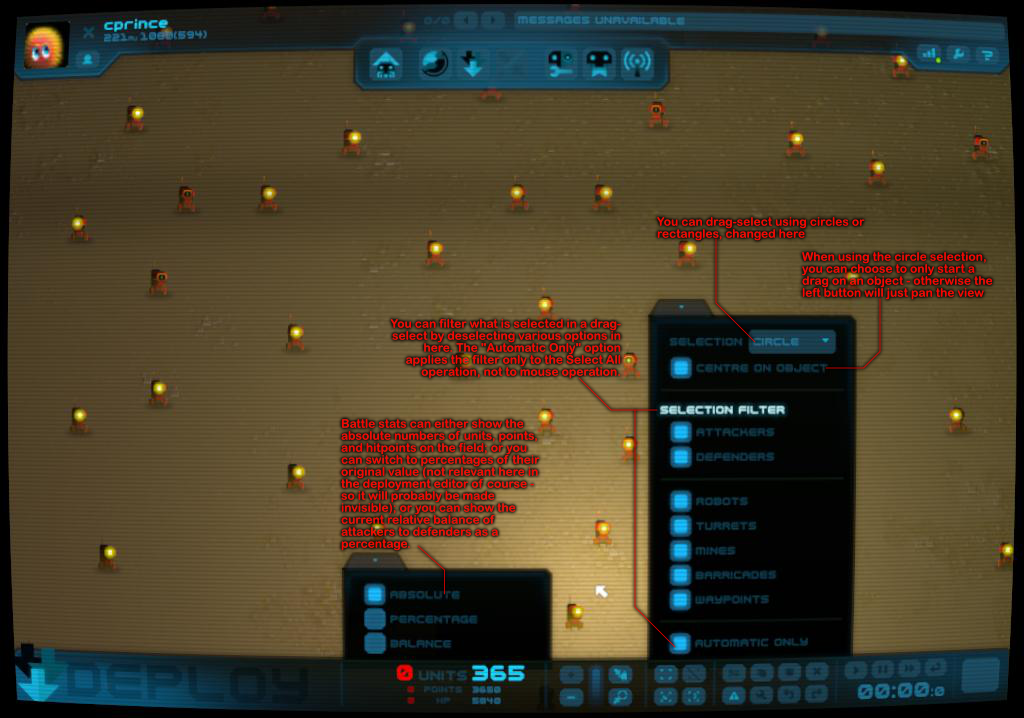Because my previous blog post was not a complete academic essay on the subject, nor indeed intended to really go any further than the few people that visit our blog, it seems that a few people are deconstructing the arguments and poking some big holes in the assertion that “The Demo is Dead”, which is fine, but the article is not at all complete, and contains no hard data (of which I have a lot). At the time, I just thought I’d pen some musings on the subject talking to people who already didn’t care (existing blog readers, who are generally customers and therefore unaffected by what we do with our existing titles).
Anyway, the internet sort of exploded in rage and disbelief that a tiny indie developer could become such a cruel, heartless, candy-snatching killjoy.
As a general reply to various comment all over the place, here are some further musings:
99 Reasons To Not Buy Your Game
This was clearly an exaggeration for literary impact, and if that’s not obvious to you, for shame. But instead of just asking me what those reasons are, maybe you could engage in devil’s advocacy, and think of some yourself. Here are some I thought of, spuriously:
- I got my fill of gameplay already from the demo. (Our demos typically gave away 25% or so of the full game progression)
- I’ve had 90% of the initial delight of the game for nothing. Paying some money for the remaining 10% is a waste of money. (Note disconnection between “delight” and actual content)
- I can’t be bothered to pay for it when I can go and play another free demo somewhere else.
- I’ve already got a bunch of games I’ve paid for but not yet even played. Maybe I’ll not bother getting this one yet.
- I played the demo ages ago and forgot all about it by the time payday came because something else distracted me in between.
- I only buy games through Steam.
- I’m a poor student/waster/single mum and I don’t spend money on games especially when I can be entertained endlessly by demos for nothing.
- I loved the game except for this one small thing that I didn’t like like I can’t remap the fire button to X and for that reason alone I’m not going to buy it.
- I thought the game was too easy but that’s because the demo can only show the first 10 levels which have to be easy to not put off the 95% of people who find it too hard.
You’re Just Using Yourself As A Single Data Point!
Some have accused me of using myself as a single data point (“I’ve never bought a game in the last 5 years from playing a demo”) and drawing my conclusions based on this, which is fallacy. This is not the case; my own, singular experience was what got me to look at the data in the first place. It was just a hunch, that I got to thinking about actually a few years ago. It’s only in the last year or so that the data has become impossible to ignore (see below for some figures).
The Nature of Puppygames Demos
Few people were aware of the exact nature of our demos, or even our games, and it’s probably worth researching because our games are of a particular ilk and available only on a particular platform. We make desktop arcade games mostly, and that’s a pretty strange niche to begin with, which substantially effects the way demos work.
Our demos were “full” versions of the games, which could be unlocked by registration (no further download). They tended to let you play the first 25% or so of the game unfettered before expiring on a cliffhanger (eg. first boss appears, or you’re just about to see the next “world”, for example).
Claims that we’re “doing demos wrong” are from people who, I suspect, have not been doing this for as long as we have. The fact is, our demos were more or less no different from nearly every other demo I’ve ever seen. They weren’t even unsuccessful either – they converted at an industry-respectable rate, AFAIK. The problem is that rate is shit and the amount of money we can charge for a successful conversion has been eroded, which brings me to…
Context Is Everything
The context of pricing and market positioning, specifically. Over the last 10 years we’ve seen the average price of an indie game plummet from $20 (sold direct by the developers) to $5 (sold on Steam or BigFish in a sale) to about $1 (sold in a bundle of some sort). Steam pioneered the price slashing in the market – I’m sure you educated types with economics degrees have a special name for this manoeuvre. In the space of a couple of short years, direct sales plummeted to less than 1/10th of what they used to be (and they were never great). Almost overnight, the chances of being an actual indie developer – and succeeding! – have dropped from “you’ll be lucky” to “you’ve as much chance of winning the lottery”. Not only had consumer expectation of prices been eroded from $20 to $5, but consumers were also taught by Steam to buy on the basis of video and recommendation and, most importantly of all, discounts.
Then, just as things didn’t seem they could get more crazy, along comes the Humble Indie Bundle, and we’re now becoming accustomed to picking up titles for a dollar or less. Again, demo unseen. We’re conditioned to buying stuff because it is cheap not because we necessarily want it. I say “we” – yes! I am one of you. I am a consumer. I’ve got a hundred games in my Steam library. I am doing all these things. I won’t buy a game if it’s not on Steam any more. I won’t buy a game if it costs over $10. And so on. This reminds me of an anecote many years ago when a friend of mine came bouncing into the room full of glee because she’d bought some mint essence. When I enquired what was so amazing, she told me that it had been 75% off so she just had to buy it. I can’t recall her ever before or since actually making anything with mint essence in it, but it was a bargain!
In this context, what we now see is that 95% of our income – any developers income – comes not from conversions of demos, but from sales via gatekeepers and bundles. What the focus of my original article was really about is that there is a case for simply dropping prices through the floor and not giving anything away for free. There is “free” stuff everywhere, already. The differentiator we now have is that if you want to sample our stuff, it will actually cost you. Otherwise it is simply unavailable. It is out of reach. You can look through the glass into the shop but you can’t touch it until you spend a (paltry) amount of money. Just like with mostly everything else in the world these days.
Are We Right?
There’s no harm in being wrong. We can be wrong. We’re going on what the data tells us, and we have a lot of data. We’ve sold 481,529 games in the last 3 years, and 30,246 of those have been to people who played a demo. That means the other 451,283 sales were made without anyone ever seeing a demo. If you want percentages, that’s 6%. We’re quite happy to be proved wrong! If the data tells us we’re wrong, we’ll go back to using demos.
Our hypothesis is, we’ll make a bit more money if we ditch demos and drop the prices. As you can say what you like about the 97% of sales being without demos and argue till you’re blue in the face that you don’t buy games without playing a demo first, go on ahead. Argue away – you’re arguing that black is white. You’re not making us 97% of our sales. The bit you need to argue over is this:
6% of our sales are to demo players, direct, and they have made us $72,000. We think that if we drop our prices hugely, and ditch demos, that we’ll continue to make 6% of our sales direct, but that we’ll make a bit more than $72,000.
The Sands Shift Beneath Our Feet
And still that’s not the whole story. The thing that most beginning developers – us included – fail to take into account is how the markets change over time. As I said, when we first started, we sold conversions on demos for games that cost $20. We started just at the tail end of a golden era in independent game distribution (typical bad luck, huh). The internet had just revolutionalised developing games and the gatekeepers were just about to move in, along with a flood of other developers who suddenly discovered they could do it too. It is suprising in hindsight that so many developers clung to the $20 price model in the face of what was happening.
Things came to a head in about 2008 or so, when we released Droid Assault. Droid Assault was released to the sound of tumbleweed. No-one was even the least bit interested. It’s a great game (IMHO, haha), but when it was released, nobody wanted to buy it. Customers were already thoroughly in the pockets of Valve and BigFish by then. If you didn’t have a game on a portal, it simply didn’t sell. DA must have shifted literally a few hundred copies. By contrast on Steam, now it’s finally out on Steam that is, it’s shifted thousands of units.
And so we must realise that the market is changing, all the time, imperceptably slowly. Let’s look at those figures I just mentioned above, and instead, let’s look at just the last 12 months:
In the last 12 months we’ve sold 77,224 games, of which just 725 were demo conversions. The demos weren’t suddenly any different. The prices weren’t suddenly any different. Suddenly, after just 2 years, we’re only making less than 1% of our sales via demos. Nothing else changed except the entire rest of the market.
So actually what you really need to be arguing over is this:
1% of our sales are to demo players, and they have made us $5200 (yes, really). We think that if we drop our prices hugely, and ditch demos, that we’ll continue to make 1% of our sales direct, but that we’ll make a lot more than $5,200.
Put that in your pipe and smoke it.























